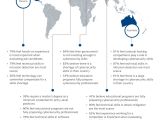The reports about the great skills shortfall in the cyber-security sector that started to appear last year have not been exaggerated, with a similar study released today by Intel Security showing that the crisis has carried into 2016 as well.
In the Hacking the Skills Shortage report released today by Intel Security, the company presents the findings of a worldwide study among top cyber-security experts from eight countries around the world: Australia, France, Germany, Israel, Japan, Mexico, the United Kingdom (UK), and the United States (US).
The results of this study reveal a deficit of cyber-security experts across different industry sectors, which has a direct economic impact on the losses caused to companies lacking the expertise to deal with the dangers coming from the cyber-security effort.
Study key findings
Respondents from across all countries said that to blame for the current skills shortage is the education sector and their local governments, which failed to adapt and train enough experts in time to fill the gap and to introduce laws that enforce a stricter cyber-security policy.
Overall, 82 percent of all study respondents reported a shortage of cyber-security skills, with 71 percent of them linking this shortage to direct and measurable damages their companies suffered.
As expected, high-value skills are the most sought after. These include intrusion detection, secure software development, and attack mitigation. On the other side of the spectrum, soft skills in communication and collaboration are the least in demand.
In 2015 alone, Intel Security reported that 209,000 job positions in the cyber-security field were not filled. The company estimates that, by 2019, there will be around two million cyber-security jobs left open around the globe.
Australia and Mexico are the hardest hit by this skills shortfall while France, the UK, and Israel are the least affected.
These last three countries are also where cyber-security experts get the highest wages, along with Japan. Cyber-security experts in Israel make around 3 to 3.5 times more than the average salary in their country.
Globally, cyber-security experts are being paid around 2.7 times better than their country's average salary, but this hasn't contributed to filling the skills gap with new personnel.
Addressing the skills shortage
Training highly skilled employees takes quite a while, and by the time these positions will get filled, the role of IT would also be expanding into our daily lives, also growing the needed talent pool itself.
Intel recommends four avenues of addressing this talent gap. First of all, companies must address the skills shortage with an increase of their cyber-security budgets.
Second and third, governments need to pass laws that impose a stricter cyber-security policy across the country's economy, and the education sector needs to broaden cyber-security training to keep up with the modern times.
Last but not least, companies and recruiters must also find new ways of recruiting cyber-security experts and then keeping them in the security field, and not letting them migrate to other activity sectors.

 14 DAY TRIAL //
14 DAY TRIAL // 

